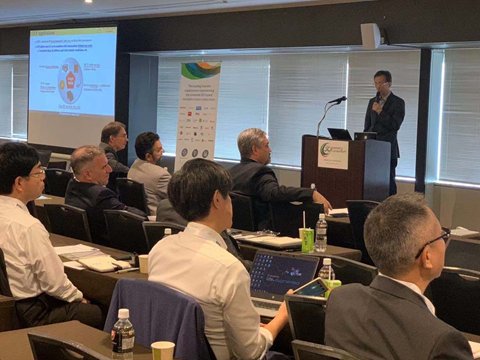Attopsemi Technology Attended 4th Japan SOI Symposium and Presented a Talk “I-fuse: A Disruptive OTP Technology”
Hsinchu, Taiwan, – Nov 20, 2019
Attopsemi Technology attended SOI Symposium on October 30th, 2019 in Yokohama, Japan and provided a talk “I-fuse™: A Disruptive OTP Technology”. The event was a huge success and attracted several hundreds of attendees.
In a well-received speech during the EDA/IP Session, Shine Chung, Chairman of Attopsemi, presented the topic “I-fuse™: A Disruptive OTP Technology ” In the OTP(One-Time Programmable) IP technologies, we defied the conventional wisdom of breaking a fuse to maintain a permanent programmed state forever, Attopsemi’s I-fuse™ is actually a “non-breaking” fuse. “I don’t mind to break a fuse, but I do care about breaking a fuse by explosion”, said Shine Chung, Chairman of Attopsemi. “The I-V curve of programming a fuse beyond the break point actually shows more like an explosion. The anti-fuse OTP also ruptures gate oxide by explosion. On the contrary, I-fuse™ is a disruptive OTP technology without disrupting a fuse.”
Comparing with the other OTP technologies on 22nm and beyond, I-fuse™ can be programmed at 1.0V, while the other anti-fuses need 4-5V to program. I-fuse™ can be programmed at 1.0mA, while the eFuse needs up to 100mA to program. “We had small IP size because we don’t need charge pumps as in anti-fuse or floating-gate OTP. We had low program voltage than the anti-fuse because ours is current programming. We had low program current because we program our I-fuse™ below a catastrophe breaking point, which is different from conventional eFuse OTP.” stated by Shine Chung.
An I-fuse™ OTP that can be read with merely 0.4V and 1uA was also mentioned in this symposium with details. “We defied the conventional wisdom of using a MOS as an amplifier that requires to be biased in high voltage and high current to sense the resistance. Instead, we used time-based sensing techniques that never used in memory design before,” said Shine Chung, “By using MOS as switches to enable discharging two capacitors, through cell and reference cell respectively, and compare the discharge rates, the resistance in the cell can be determined higher or lower than the reference resistance so as to convert into logic data. The read energy consumed is only 1/100 of the conventional sensing, which is good for energy harvest IoT application. Eventually most IoT devices will be battery-less.”

